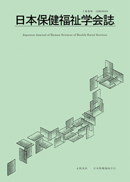Volume 28, Issue 1
Displaying 1-12 of 12 articles from this issue
- |<
- <
- 1
- >
- >|
-
2021Volume 28Issue 1 Pages cover1-
Published: December 31, 2021
Released on J-STAGE: April 21, 2022
Download PDF (919K) -
2021Volume 28Issue 1 Pages cover2-
Published: December 31, 2021
Released on J-STAGE: April 21, 2022
Download PDF (919K)
-
2021Volume 28Issue 1 Pages 1-13
Published: December 31, 2021
Released on J-STAGE: April 21, 2022
Download PDF (905K)
-
2021Volume 28Issue 1 Pages 15-25
Published: December 31, 2021
Released on J-STAGE: April 21, 2022
Download PDF (886K)
-
2021Volume 28Issue 1 Pages 27-29
Published: December 31, 2021
Released on J-STAGE: April 21, 2022
Download PDF (394K)
-
Article type: other
2021Volume 28Issue 1 Pages 31-33
Published: December 31, 2021
Released on J-STAGE: April 21, 2022
Download PDF (381K) -
2021Volume 28Issue 1 Pages 34-35
Published: December 31, 2021
Released on J-STAGE: April 21, 2022
Download PDF (379K) -
Article type: other
2021Volume 28Issue 1 Pages 36-38
Published: December 31, 2021
Released on J-STAGE: April 21, 2022
Download PDF (384K) -
2021Volume 28Issue 1 Pages 39-44
Published: December 31, 2021
Released on J-STAGE: April 21, 2022
Download PDF (450K) -
2021Volume 28Issue 1 Pages 45
Published: December 31, 2021
Released on J-STAGE: April 21, 2022
Download PDF (388K)
-
2021Volume 28Issue 1 Pages cover3-
Published: December 31, 2021
Released on J-STAGE: April 21, 2022
Download PDF (517K) -
2021Volume 28Issue 1 Pages cover4-
Published: December 31, 2021
Released on J-STAGE: April 21, 2022
Download PDF (553K)
- |<
- <
- 1
- >
- >|
